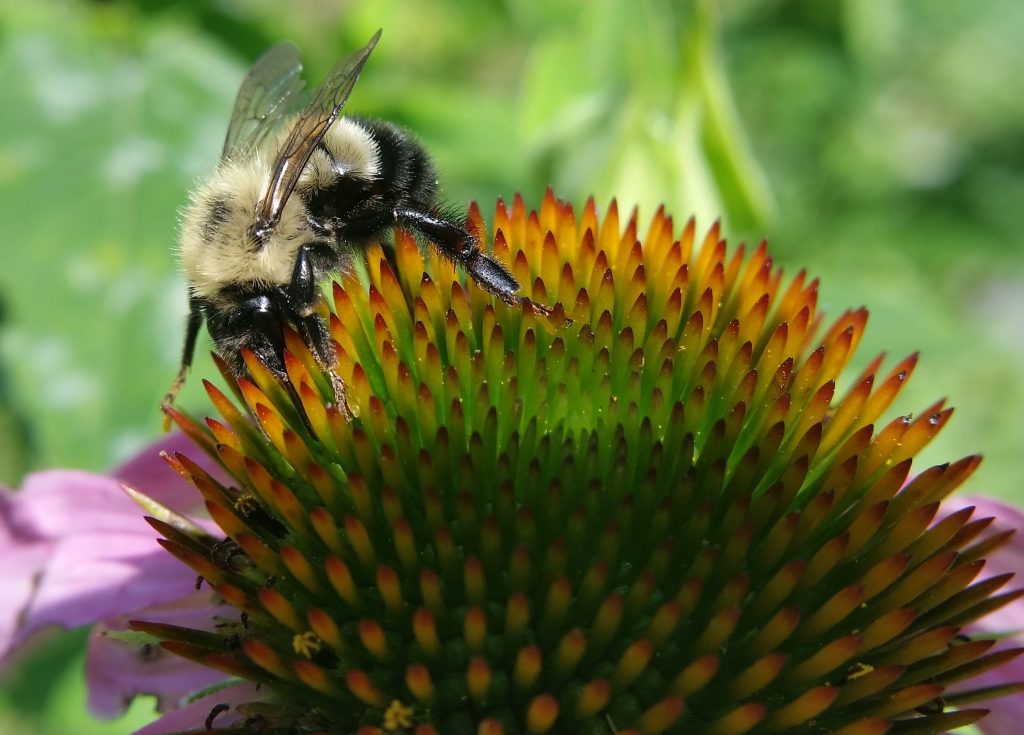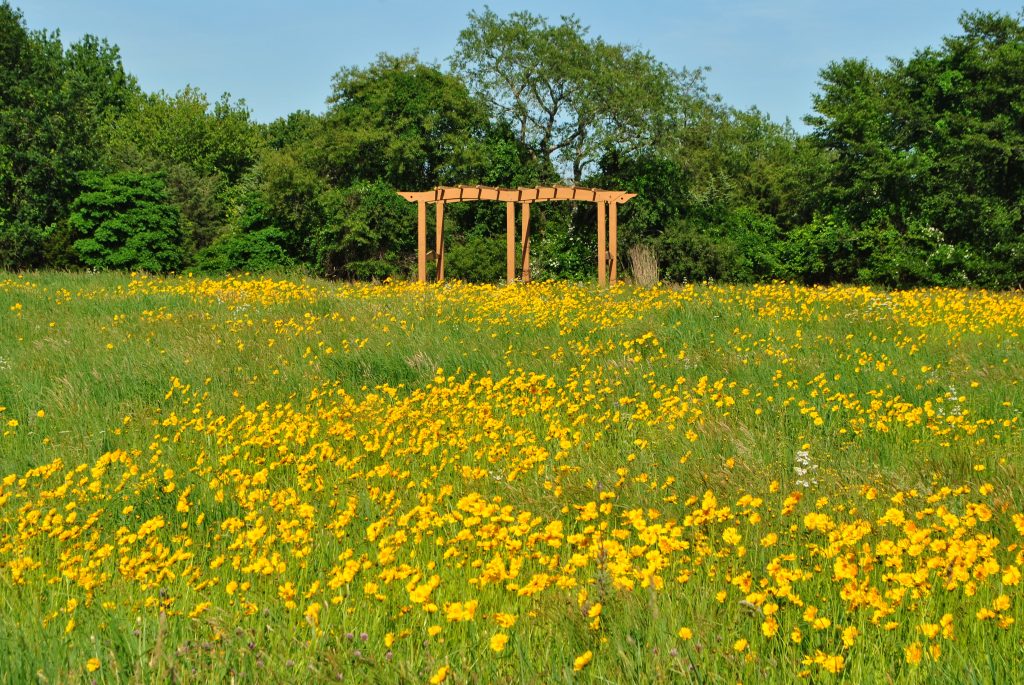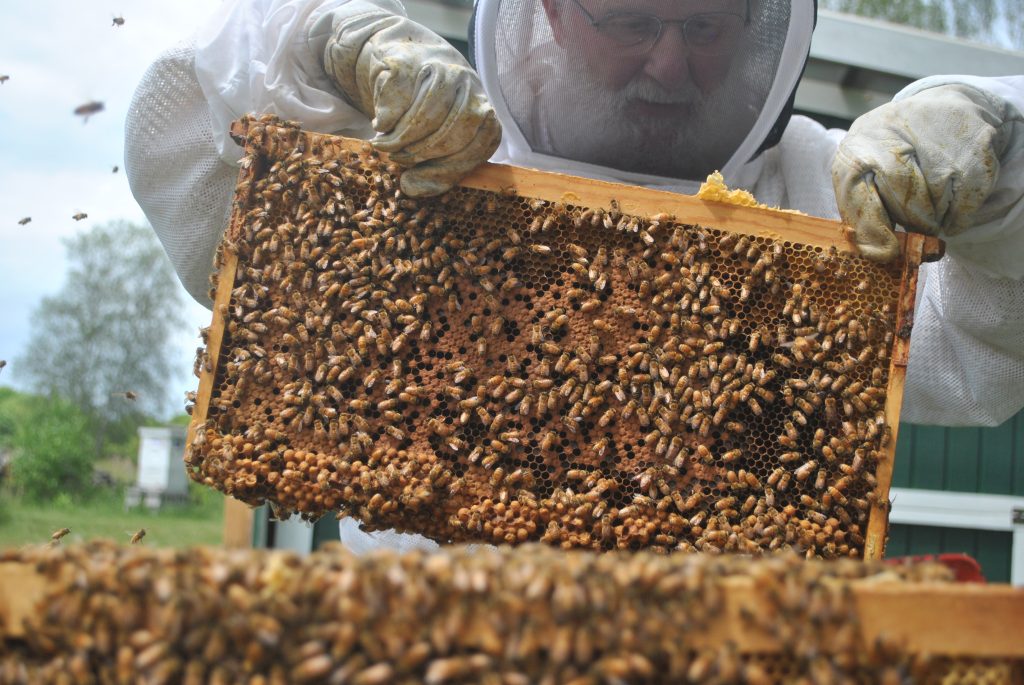
It was mid-October, not exactly a beach day, when Jim Turenne suited up for a marine rescue mission. Not a bathing suit, but a bee suit. “Rescue on the Rocks, Jamestown-style,” announced Turenne, chief beekeeper for Conanicut Island Land Trust and Jamestown bee chaser.
Turenne was called to the East Ferry shore to investigate a swarm of bees hovering over a cluster of rocks in six feet of water. Working against the tide required prompt action, a rescue box, and a borrowed kayak. “Water’s a bit cool, but luckily the air was warm,” reported Turenne. “Getting the bees to funnel into the rescue box was easy. The hard part was getting on the kayak and back to shore.”
New England’s swarm season, when honey bees follow their queen to new digs, coincides with spring, specifically May or June — but with changes in the weather, swarm season can extend into autumn. Rehoming swarms is preferred, so bees survive and thrive.
Why so keen on bees? Bees are primary pollinators vital to growing food and various ecosystems’ health and functionality. One in every three bites of food and about 80% of the world’s flowering plants require pollinators, like bees, to reproduce.
But, bees are in danger. Bee and other pollinators’ health continues to decline steadily due to parasites, poisons, and human interference (habitat destruction and climate change). RI is home to various honey bees as well as 400 native bee species, including mason, bumble, miner, and carpenter bees.
URI’s Bee Lab is a testament to the Ocean State’s grave concern for the precariousness of pollinators. Led by Dr. Steven Alm, Professor of Plant Sciences and Entomology, the URI team is at the forefront of pollinator research. The team studies insect behavior in the field (bees and pollination, bumble bee nesting, antlions, spider wasps), the chemical ecology of insects, and less toxic pest control methods (entomopathogenic nematodes, bacteria, fungi).
“When you lose pollinators, you lose plants. The relationship is tight,” warns Dr. Alm. “Diversity is critical; native bees are more at risk, with several species endangered.” Furthermore, indigenous bees are proven to be more efficient pollinators of native plants and often will not recognize foreign plants; conversely, transplanted foreign plants may not recognize native bees.

The Bee Lab supports both native and managed bee populations. Bumblebees, like 90% of all native bees, are ground or wood burrowers. Although social like honey bees, the bumblebee is solitary, often nesting in rodent holes, bird houses, or dead tree bases. The queen lays eggs in the ground, in separate pods, nesting them in a ball of wax. Dr. Alm recommends Goddard Memorial Park in Warwick for prime observation of ground-nesting native bumblebees. Early spring is best, when holes slightly larger than anthills are visible.
The Bee Lab’s work on novel varroa mite controls is crucial. Varroa mites, external parasites, are considered one of the most damaging pests in the world and one of the gravest threats to honeybees.
RI Beekeepers, founded in 1917, actively supports beekeeping in RI with in-person beginner beekeeping classes, mentorships, monthly meetings (their upcoming meeting will be on March 10, regarding “Legal Concerns for Beekeepers”), as well as resources for equipment rental, recipes, and even a comprehensive list of swarm rescuers.
Beekeeping is rising in popularity for hobbyists, naturalists, and professional farmers alike. It can be a lucrative side-hustle as the demand for sustainable, organic food grows. Originally crossing the Atlantic in the 1620s, honeybees acclimated quickly to local environs as ‘general’ pollinators with similar vegetation. Honey is only produced by honeybees (and not all species!).
Turenne’s full-time gig is state soil scientist, and he is secretary of the all-volunteer Conanicut Island Land Trust (CILT), dedicated to preserving Jamestown’s natural resources and open spaces. When Godena Farm was purchased, CILT transformed the hayfields into a 26-acre pollinator sanctuary. CILT was gifted a bee shed, hives and equipment; but no members, including Turenne, had beekeeping experience. He turned to RI Beekeepers Association (RIBA) for help. By 2016, two healthy, fully functional hives were thriving at Godena Farm with acres of wildflowers, a pollinator garden, native huckleberry, inkberry and coastalsweet pepperbushes, trees, and even an apple orchard.

Dennis Breinser runs educational programs for schools and clubs emphasizing the importance of honeybees, pollination, and the interdependence between humans and the environment. Turenne tends to the honeybees year-round to ensure hives are alive and viable, introducing sugar patties in winter to augment food supplies. Bees emerge in late February to feast on skunk cabbage and witch-hazel sprouts in marshy woodlands. RI flowering trees like linden, cottonwood, red maples, and apple trees are pollinator and migrating songbird favorites. Godena Wildflower Raw Honey, both jar and comb, is harvested, spun, and filtered in summer.
Apiculture, beekeeping as an agricultural commodity, continues to grow as natural pollinators decrease. Large-scale bee farmers lease migratory pollinators to farmers looking for maximum quality and bountiful crops. Almond farming is a prime example. According to the CA Almond Board, “Every almond we eat exists because a honeybee pollinated an almond blossom, so they’re an essential partner for almond farmers. Companies like Rent Mother Nature and Leasehoney connect beekeepers to landowners and farmers eager to pollinate crops.
Honey is known for its medicinal powers, such as antioxidants and anti-inflammatory, and now beekeeping is taking a therapeutic turn as a salve for mental health disorders, such as PTSD and substance abuse. Organizations like Bees for Veterans tap into mindfulness practices, essential to beekeeping, and the connection to nature.
Whether you live in an apartment in the city or a home in the suburbs, you can cultivate and protect pollinators with healthy gardens and landscapes. Plant wildflowers, blueberries, or other native flora early in spring and add some clover to your lawn. Avoid pesticides, herbicides, fungicides and reduce standing water which attracts mosquitoes (spraying). Befriend clover and taraxacum; native bees and pollinators snack on nectar-rich dandelions!
MORE TO EXPLORE:
• World Bee Day 2024, May 20
• The Bee Cause project educational programs and grants
• The Bee Lab at URI includes resources for cultivating bee-friendly gardens